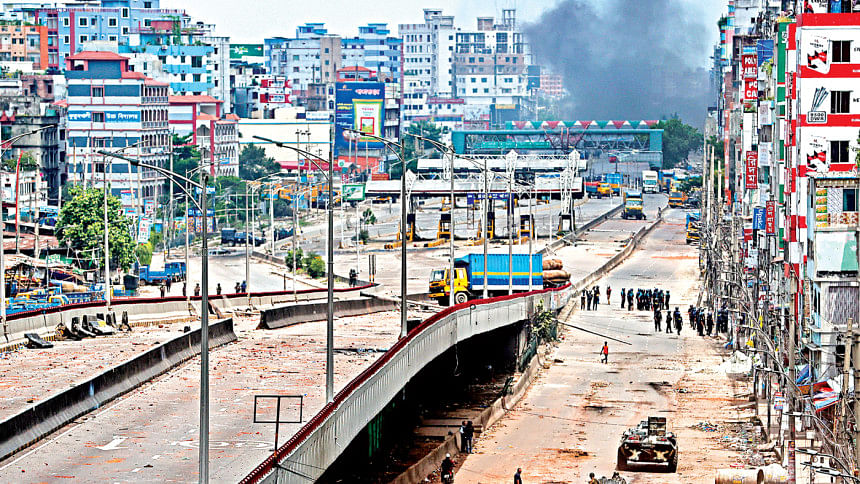July 20, 2024: Curfew begins amid rising death toll

The first day of the nationwide curfew, imposed late on the night of July 19, was marked by widespread unrest and violence that left at least 21 people dead and scores injured across Dhaka and other parts of the country.
Most of the victims were hit by bullets, hospital sources confirmed.
The curfew was declared following days of deadly clashes over the quota reform movement. In a late-night announcement, the government deployed army personnel to assist the civil administration.
Army troops were seen patrolling major points of the capital and key locations in other districts from early morning.
Despite the curfew, thousands of demonstrators -- students and non-students alike -- took to the streets across the country. They brought out processions, blocked roads and highways, and set fire to tyres and wooden planks.
In Dhaka, nine people were reported killed.
One of the most intense flashpoints was Jatrabari, where protesters blocked the Dhaka-Chattogram Highway with parked trucks and covered vans.
Police responded with gunfire, teargas shells, and sound grenades. The protesters fought back, hurling bricks and setting barricades ablaze. Witnesses said helicopters hovered at low altitude, firing teargas canisters from the air.
In Mohammadpur, a large crowd attempted to march to the local police station. Police responded with bullets, sound grenades, and teargas to disperse the crowd there too. Agitators regrouped near Mohammadpur Bus Stand and blocked roads from there to Beribandh.
Members of the Armed Police Battalion, BGB, and army arrived around 5:15pm, triggering a severe clash. By 6:30pm, gunfire and stone-throwing continued. Protesters, including women, children, and students, had also blocked Sat Masjid Road and key intersections from Dhanmondi 15 to Shankar.
In Mirpur-10, law enforcers fired teargas and bullets as demonstrators blocked Rokeya Sarani from Kazipara to Benarashi Palli. Protesters also clashed with law enforcers at Mouchak-Rampura, where parts of the road remained blocked since July 18.
In Savar, five people were killed in separate incidents. Kurban Ali, a 55-year-old poultry trader, was shot in the throat while inside his shop during a clash.
Rickshaw-puller Roni, 27, and Mehedi, 24, a mason, were both shot dead later in the day. Thirteen-year-old Saad Mohammad Khan, a sixth-grader, was killed while watching the protests.
In Narayanganj, sporadic clashes broke out from Signboard to Kanchpur. Sound grenades were hurled from helicopters. Three young men -- Sajal, Shahin, and Hridoy -- were declared dead at Sugondha Hospital.
Meanwhile, Minarul, 25, a garment worker, died of a gunshot wound to the abdomen. Around 50 others were injured and admitted to local hospitals.
In Mymensingh's Gouripur upazila, three people were killed, and at least 30 injured, including 12 police personnel, during violent confrontations. In Phulpur, a pedestrian named Saiful Islam was killed in a clash.
Similar incidents of violence were reported in Kishoreganj, Narsingdi, Sylhet, and Gazipur.
In Narsingdi, demonstrators torched the Panchadhana Muktijoddha Complex and a highway police outpost in Shibpur. In Sylhet, protesters tried to block the Sylhet–Sunamganj Highway. In Gazipur, police boxes were vandalised at Board Bazar and Chandana intersection.
Meanwhile, differences emerged between two factions of the quota protest leadership over demands and strategy.
One group, represented by Hasnat Abdullah, Sarjis Alam, and Hasib Al Islam, placed an eight-point demand in a meeting with ministers at the State Guesthouse Padma on July 19 night. These included financial compensation, legal immunity for protesters, and withdrawal of law enforcement from campuses.
However, another group rejected the meeting as a personal initiative and released a separate nine-point demand, which included an apology from the prime minister and the resignation of ministers Obaidul Quader and Asaduzzaman Khan.
The internet blackout continued for the third day, severely affecting digital services including mobile banking, online payments, and communication. Protest leaders alleged that the government was using the blackout to spread misinformation and divide the movement.
Separately, the Detective Branch arrested BNP Standing Committee member Amir Khasru Mahmud Chowdhury from his Banani residence at night.
Earlier in the day, a Dhaka court placed BNP leaders Nazrul Islam Khan and Ruhul Kabir Rizvi on one-day remands in connection with cases related to the violence.
In response to the unrest, the government declared July 20 and July 21 as public holidays for all government, semi-government, autonomous, and non-government institutions, except those providing emergency services.
The Supreme Court also scaled back its operations, with lower courts functioning under limited magistrates, and the Appellate and High Court Divisions holding shortened sessions.
As curfew gripped the nation and the death toll continued to rise, the streets of Bangladesh echoed with a chilling message: the demands of the people would not be silenced by force, and the battle for justice had crossed a point of no return.

 For all latest news, follow The Daily Star's Google News channel.
For all latest news, follow The Daily Star's Google News channel. 








Comments